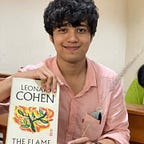Open & Close
There is a man next to me, but I don’t remember his body. So I write him a note, tie it to a hundred pigeons, and send it in his direction. I ask him where he comes from, who he is, and what he does. When he doesn’t answer, I turn on the radio, and we listen to nothing that moves us. At four, we play carrom. On Sundays, it’s the two of us because others now have families. At four-thirty, the train leaves. We hear it in silence. Things passing between has never been too strong. I watch him as though he is on the other side of the traffic, but none of us wait for the traffic light to change.
At five-thirty, we play telephone. I whisper something, the other repeats it. He says something, but I misunderstand. At six, I ask him if he could stay till something of this day feels like a change. But he has already reached his wallet and jacket.
There is a visitor next to me who lends his body so I could throw it in a burning pile and assume it as some kind of an offering. Since we don’t know how else to spend the night, we listen to the windows brace for the wind. Once again, to coordinate this traffic between us, I ask him where he was born or what he did when he missed someone. He recoils when I touch him. To a population, this is what a blackout must feel like — everyone hurrying to touch what we won’t remember.
I shake people’s arms, give them my address, ask them to come sometime. They do the same.
The rooms I own have been occupied with more visitors. One, two, and then too many. I don’t recognize any of them, and they are gone before I can ask.
And in the cool breeze, I have carried myself a distance. Now, there are many people staring passively without music. I wonder if this is how a family looks like.
At six, when everyone prepares to go, I see them off on the road. One last time, I call out for them, but they only wave in the evening light. I have been too late to ask, and too far to receive an answer. This is how a migration feels when you are not a part of it. This is how it feels to hold something without wanting it to disappear.
